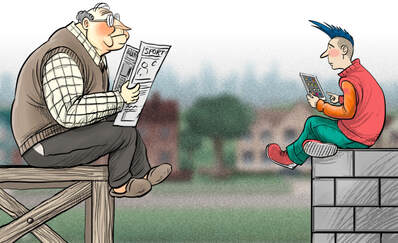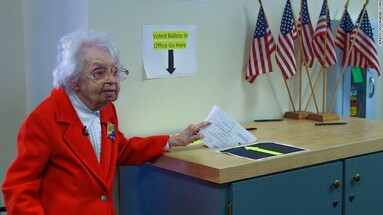
Senior citizens have the highest rates of climate-change denial of any demographic group in the United States. But it isn't primarily due to stubbornness, a quality that old folks are unjustly tarred with in the meme-ridden judging chamber that is popular culture (which means youth culture). There are, I believe, many reasons for old folks' reluctance to accept the facts about climate change, ranging from political affiliation to personal struggles that are exclusive to their group. As my mother-in-law Hadassah Paul, dearly deceased, used to say: getting old ain't for sissies. It's a distinct and challenging life phase, and I write these words with a bean-baggy heating pad, inherited from Hadassah, layed across my right trapezoid because it aches today for no apparent reason.
Let's compare the Millennial Generation (ages 23-38) to the Silent Generation (ages 74-91) -- young people and their grandparents, roughly. According to a 2018 study by the Pew Research Center, two-thirds of Millennials agree that there's solid evidence of global warming caused by human activity, compared to only 40 percent of Silents who concur. Among Millennials, one-third declare positions of climate-change denial: that the world is not warming, or that it's warming but due to natural phenomena unrelated to the burning of fossil fuels. A whopping 56 percent of Silents, however, display climate-change denial. Altogether, that's quite a spread between grampa and grandson, a generation gap if you will.
Ignorant old folks, you might scoff. But how is scoffing going to help?
Let's compare the Millennial Generation (ages 23-38) to the Silent Generation (ages 74-91) -- young people and their grandparents, roughly. According to a 2018 study by the Pew Research Center, two-thirds of Millennials agree that there's solid evidence of global warming caused by human activity, compared to only 40 percent of Silents who concur. Among Millennials, one-third declare positions of climate-change denial: that the world is not warming, or that it's warming but due to natural phenomena unrelated to the burning of fossil fuels. A whopping 56 percent of Silents, however, display climate-change denial. Altogether, that's quite a spread between grampa and grandson, a generation gap if you will.
Ignorant old folks, you might scoff. But how is scoffing going to help?

Unfortunately, climate change has become a political issue -- not so much what to do about it, but whether it exists and is in fact caused by people. So let's dig down a little further. According to the Pew study, only 12 percent of Millenials who are Democrats (or lean Dem) are climate denialists, while 87 percent see solid evidence of human-caused climate change. At the same time, in the same country on the same planet, 78 percent of Silents who are Republican (or lean Repub) are climate denialists, while only 17 percent acknowledge human complicity with climate change. Those are close to inverse realities! That's a yawning, nearly unbridgeable generation gap -- one that even Evel Knievel might have had a hard time jumping across on his turbo-powered motorcycle. How do people with such divergent views even talk to each other? Is there room between them for mutual respect?
 Ruline Steininger of Iowa, age 103
Ruline Steininger of Iowa, age 103 A few more political stats and I'm done for now. Seniors citizens (over age 65), not surprisingly, are more conservative than young people. According to a 2019 Gallup poll, 43 percent identify as conservative, with 30 percent as moderate and 22 percent as liberal. So, clearly, conservatives are the biggest group among the 54 million senior citizens in the USA (a number slated to rise to 83 million by 2050). Moreover, old folks have an outsized influence at the ballot box. In the last presidential election, 71 percent of seniors turned out to vote, an especially stupendous result when you consider how many are disabled, live alone or spend their days in nursing homes. In contrast, citizens aged 18-29 dropped their Xboxes to vote for Trump or Clinton at an underwhelming rate of 46 percent.
Politics, however, is just one way to understand seniors' often misguided attitudes on climate change. As I mentioned above, several profound and deeply personal issues appear to be at play, and it is in that realm that we may find the opportunity for education and outreach. Stay tuned.
Politics, however, is just one way to understand seniors' often misguided attitudes on climate change. As I mentioned above, several profound and deeply personal issues appear to be at play, and it is in that realm that we may find the opportunity for education and outreach. Stay tuned.
 RSS Feed
RSS Feed